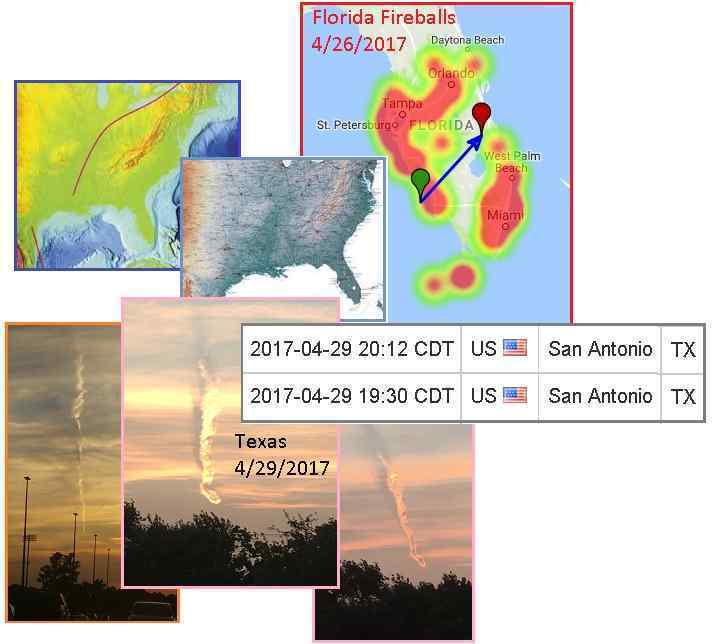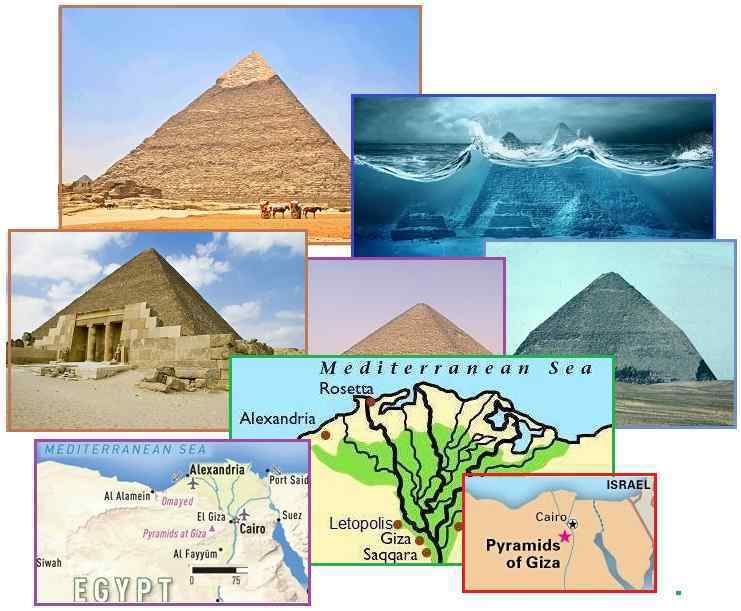
| |
 |
ZetaTalk Chat Q&A for May 6, 2017
Is this due to debris coming in? Fireballs? Or something else? All in the New Madrid region. [and from another] Something just Fell from Sky in Texas!! April 29, 2017 http://www.godlikeproductions.com/forum1/message3513160/pg11 I swear, it looked like a bomb coming down. … it was coming down.. then, just stopped .. but it dropped kinda fast, then, just stopped in air. … Doom on, more incoming, NASA's fireball network is down!! [and from another] Big Explosion Felt in St. Pete, FL April 29, 2017 http://www.godlikeproductions.com/forum1/message3513142/pg1 I heard what I thought was claps of thunder here in Gainesville. .. I'm in Deltona and saw a bright flash through closed blinds, saw a vapor trail when I looked outside. … "Fireball" seen in North Carolina and Tennessee around that time. [and from another] Long-Lasting Fireball over Florida April 26, 2017 https://watchers.news/2017/04/26/long-lasting-fireball-over-florida/ A long-lasting fireball was seen over Florida on April 26, 2017. The event lasted up to 20 seconds.

Clearly a spate of debris from the tail of Nibiru raked the SE United
States during late April, but what was observed was more than fireball
trails. Fireballs rake in a horizontal direction, and usually are
accompanied by sound as there is an explosion when they land or burst due
to the heat generated by entry. Light
towers caused by the release of methane gas rise silently, straight
up, and alight with a flash that leaves a tower of smoke. What occurred in
Texas were methane towers, due to the unrelenting tension from the New
Madrid diagonal pull.
We have stated that the New Madrid will start its rip from the lower
portion of the Fault Line, which is in the extreme southern states. This
is Texas and Louisiana and even, due to similar soft rock strata, Florida.
This is, in fact, the region from Memphis on down along the Mississippi.
The East Coast Fault Line that curls through Alabama and thence up along
the East Coast states is also in this soft rock. Thus the confusion, as
the booms and light flashes are more
than fireball spates. The rock is splitting open, with a boom, and then
methane towers result.
My question have to do with the Giza Pyramid, I want Zeta if they have time to clarify a theory-event! Some researchers suggest that the Great Pyramid of Giza exhibit erosion due to deep water saturation. Some have a theory about a big surge of water Archaeologist Sherif El-Morsi suggests that the Giza plateau was once flooded by a surge. Myself I was wondering about the water erosion, special why tip of the great Pyramid is relatively intact but the bottom part is eroded is against of erosion progression that is happening on the land , many of the pyramids around the world have the tip eroded by rain, wind, hot cold cycles , but with Great pyramid is not the case! Zeta did mention that the pyramid been thru at least one poleshift if not more being use by Annunakis like a sighing device. For me also I know about the Big sloshing Waves that happen during Poleshifts .Is possible that the deep water erosion to be the wave that slosh back from the Mediterranean Sea ,after all the Gyza plateau is at the edge of Nile delta ! If that is the case when it happened or is something else that leave the deep water erosion clues? [and from another] http://www.theeventchronicle.com/study/pyramids-sphinx-built-great-flood/ Researchers suggest that the Sphinx, the Temple of the Sphinx, and the first 20 fields of the Great Pyramid of Giza exhibit erosion due to deep water saturation. the entire Giza landscape, including the Pyramid and Sphinx displays signs of erosion, suggesting that in the distant past, these magnificent ancient structures were submerged under water. Dr. Robert M. Schoch was one of the first researchers to really address the theory that the structures of the plateau are much older than previously thought. In the early 90’s, Dr. Schlock suggested that the Sphinx was thousands of years older than archaeologists believed, dating back to 5000-9000 BC, this suggestion was based on erosion pattern of water found at the monuments and the surrounding rocks.

Though just over 100 miles from the Mediterranean coastline, Giza has its
toes in the flood plain of the Nile, and cannot thus be considered to be
200 feet above sea level, our standard advice
for avoiding the Pole Shift tides. In addition, the backwash from the Nile
would have lasted for months, given that the Nile drains a large swath of
land and the deluge following any Pole Shift lasts for months. But it was
more than a water wash that caused erosion on the lower faces of the Great
Pyramids. The rocks on the face are supported from the bottom
up, such that erosion on the bottom layer would create a lack of
support on the layer above it, and on up in this manner. The top peak
would be the last to crumble.
Why would the face of a pyramid lose support when the internal support
structures did not? The Great Pyramids, built approximately 4,000 years
ago to act as navigational devices for any Annunaki still remaining on
Earth, had not been through prior Pole Shifts until the last passage
approximately 3, 600 years ago. Thus, they were built on sand,
relying upon the weight of the pyramids themselves to hold them in place
until no longer needed. As we have emphasized, water on the move scours
the soil around building supports, and thus eroding the sand along the
exposed edges of the pyramids, these rocks began to drop.